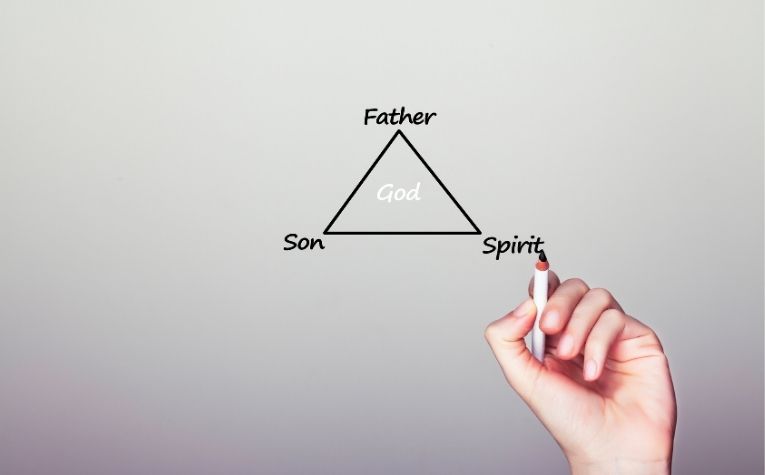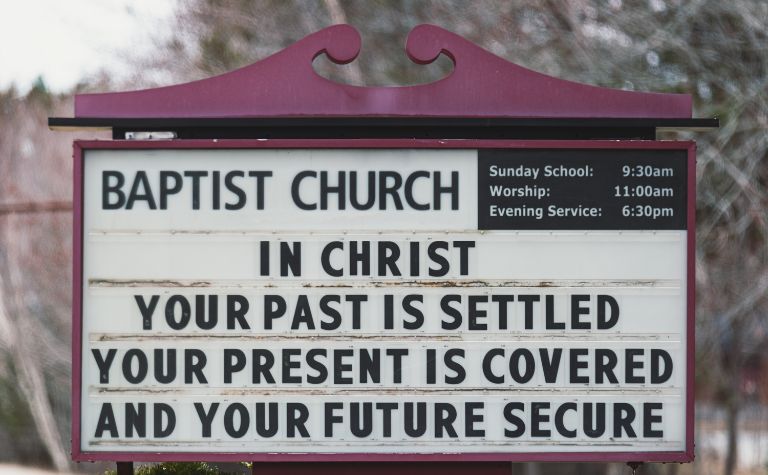The doctrine of the Trinity has always been central to Christianity. The Baptist tradition is one of the largest branches of the Christian faith in the world today. A lot of people want to know what Baptists believe about the Trinity.
Baptists believe in the Trinity. This means they believe that there is one God who exists in three persons. Baptists believe that the Father, Son (Jesus Christ), and the Holy Spirit are each fully God. The Trinity is so central to Baptist theology that a person cannot be a Baptist if they don’t believe in the Trinity.
Why do Baptists believe in the Trinity? Where do they find the doctrine taught in the Bible? These questions and others will be answered in the following paragraphs.

What Do Baptists Believe About the Trinity?
Christians have always believed that God is simultaneously one and three. Baptist denominations and churches have historically affirmed the Trinitarian nature of God because they have always existed with the contours of the orthodox Christian faith. (Also see What’s the Difference Between First Baptist and Second Baptist?)
Key term | The Trinity: This doctrine states that there is one God, who exists as three persons – Father, Son (Jesus Christ), and Holy Spirit – and that each person is fully God. Each person is fully divine, eternal, and not created.
Christians, including Baptists, acknowledge that there is some mystery to the doctrine because there is some mystery in the nature of God.
- “Mystery,” however, does not mean there is confusion or ambiguity in the nature of God, only in people’s ability to full comprehend it.
- Baptists believe that it’s true that God is one and three, yet they acknowledge not having exhaustive knowledge of how that is true.
Christians have not only believed in the Trinity since the time of Christ, but the Church has worked at articulating the doctrine and for the purposes of educating believers as well as for defending the doctrine from critics. (Also see Do Baptists Believe Jesus is God?)
Wayne Grudem, Baptist theologian: “The Trinity is a mystery that we will never be able to understand fully. However, we can understand something of its truth by summarizing the teaching of Scripture in three statements: 1. God is three persons. 2. Each person is fully God. 3. There is one God.” [1]
The Nicene Creed, which was articulated in the early 4th century, describes Christ in different terms than God the Father. Yet, at the same time, it states that he is “of the same essence as the Father” [2].
Key term | Creed: A creed is a belief statement. Creeds don’t create doctrine, they articulate it. The Nicene Creed didn’t make up the doctrine of the Trinity, it merely sought to summarize and explain what the Bible teaches about the nature of God.
- God is one in so far as all three persons are all of the same essence or substance, but God is three in that He is made up of three persons.
- Although Christianity teaches that God is three persons, it also teaches that each of the three persons is fully God.
The Nicene Creed was written to address a heresy in the early church that argued that Christ was a created being and not fully God.
Key term | Heresy: In relation to Christian theology, a heresy is a belief or doctrine that incorrectly states or reflects the Bible’s teaching on a particular topic. When heresies arose in the early church, leading pastors and theologians would work together to articulate Scripture’s teaching on a topic, often in a creedal statement.
- Baptists, like other Christians, believe that each member of the Trinity has always existed and that although they might differ in roles, they do not differ in status or value.
- For Baptists, the doctrine of the Trinity comes directly and clearly from the teaching of Scripture.
Scriptural support: For instance, Matthew 28:19 supports the personhood of each member of the Trinity, while verses like Titus 2:13, and Acts 5:3-4, affirm the Godhead of each of the three persons. Interpreted together, along with many other verses, the reality of the Trinity emerges.
- “Therefore go and make disciples of all nations, baptizing them in the name of the Father and of the Son and of the Holy Spirit.” (Matt. 28:19); Baptists see allusions to the Trinity in texts like this one. (Also see What Bible Translation Do Baptists Read?)
- “while we wait for the blessed hope—the appearing of the glory of our great God and Savior, Jesus Christ.” (Titus 2:13); Baptists see Christ referred to as God in texts like this one.
- “Then Peter said, ‘Ananias, how is it that Satan has so filled your heart that you have lied to the Holy Spirit and have kept for yourself some of the money you received for the land? Didn’t it belong to you before it was sold? And after it was sold, wasn’t the money at your disposal? What made you think of doing such a thing? You have not lied just to human beings but to God.'” (Acts 5:3-4); Baptists see the Holy Spirit referred to as God in texts like this one. (Also see Do Baptists Believe in the Holy Spirit?)
Millard Erickson, Baptist theologian: “Although the doctrine of the Trinity is not expressly asserted, Scripture, particularly the New Testament, contains so many suggestions of the deity and unity of the three persons that can we can understand why the church formulated the doctrine, and conclude that they were right in so doing.” [3]

Baptists Believe the Father Is God
Baptists, like other Christians, believe that the Father is fully God and is one of the three members of the Trinity. Baptist churches have articulated and taught this belief in a number of “confessions” since their tradition was established in the early 17th century.
Key term | Confession: In relation to Christian history and theology, a “confession” is a statement that describes a group’s beliefs or doctrine. There have been over 25 historically recognized Baptist confessions since 1611. [4]
The table below provides four examples, each of which comes from a Baptist confession that articulates doctrine about God the Father.
| Confession | Key statement |
|---|---|
| Helwys’ Declaration of Faith (1611) | “That there are THREE which bear record in heaven, the FATHER, the WORD, and the SPIRIT; and these THREE are one GOD, in all equality, (1 John 5:7; Philippians 2:5, 6). By whom all things are created and preserved, in Heaven and in Earth. (Genesis 1).” |
| First London Baptist Confession (1644) | “In this God-head, there is the Father, the Son, and the Spirit; being every one of them one and the same God; and therefore not divided, but distinguished one from another by their several properties; the Father being from himself, the Son of the Father from everlasting, the Holy Spirit proceeding from the Father and the Son.” |
| The Philadelphia Confession (1742) | “In this divine and infinite Being there are three subsistences, the Father, the Word (or Son), and Holy Spirit, of one substance, power and eternity, each having the whole divine essence, yet the essence undivided; the Father is of none neither begotten nor proceeding.” |
| The Baptist Faith and Message (2000 revision) | “God as Father reigns with providential care over His universe, His creatures, and the flow of the stream of human history according to the purposes of His grace. He is all powerful, all knowing, all loving, and all wise. God is Father in truth to those who become children of God through faith in Jesus Christ. He is fatherly in His attitude toward all men.” |
Baptists Believe Jesus Christ Is God
Baptists, like other Christians, believe that the Son, Jesus Christ, is fully God and is one of the three members of the Trinity. Like the doctrine of God the Father, Baptist churches have been unwavering in this belief since the establishment of their tradition in the early 1600’s.
| Confession | Key statement |
|---|---|
| The Second London Baptist Confession (1689) | “The Son of God, the second person in the Holy Trinity, being very and eternal God, the brightness of the Father’s glory, of one substance and equal with Him who made the world, who upholds and governs all things He has made, did, when the fullness of time was complete, take upon Him man’s nature.” |
| The New Hampshire Confession of Faith (1833) | “in the unity of the Godhead there are three persons, the Father, the Son, and the Holy Ghost; equal in every divine perfection and executing distinct but harmonious offices in the great work of redemption” |
| The Baptist Faith and Message (2000 revision) | “Christ is the eternal Son of God. In His incarnation as Jesus Christ He was conceived of the Holy Spirit and born of the virgin Mary… He is the One Mediator, fully God, fully man, in whose Person is effected the reconciliation between God and man.” |
| North American Baptist – Statement of Faith | God “exists eternally in three coequal persons who act together in creation, providence and redemption… The Son became man, Jesus Christ, who was conceived of the Holy Spirit and born of the Virgin Mary (John 1:14; Matthew 1:18). Being fully God and fully man, He revealed God through His sinless life, miracles, and teaching.” |
Key term | Statement of Faith: A statement of faith has the same purpose as a “confession” (see above). Because the modern use of the term “confession” often doesn’t imply the articulation of doctrine, some groups choose to use the term “statement of faith.”
Charles Spurgeon, Baptist pastor: “Depend on it, my hearer, you never will go to heaven unless you are prepared to worship Jesus Christ as God.”

Baptists Believe the Holy Spirit Is God
Baptists, like other Christian traditions, affirm that the Holy Spirit is fully God and one of the members of the Trinity. This is not in itself, particularly Baptist, but a view held by the majority of the major Christian denominations.
| Confession | Key statement |
|---|---|
| The Second London Baptist Confession (1689) | “In this divine and infinite Being there are three subsistences, the Father, the Word or Son, and Holy Spirit… all infinite, without beginning, therefore but one God, who is not to be divided in nature and being, but distinguished by several peculiar relative properties and personal relations…” |
| The New Hampshire Confession (1833) | “Inn the unity of the Godhead there are three persons, the Father, the Son, and the Holy Ghost; equal in every divine perfection and executing distinct but harmonious offices in the great work of redemption.” |
| The Baptist Faith and Message (2000 revision) | “The Holy Spirit is the Spirit of God, fully divine. He inspired holy men of old to write the Scriptures. Through illumination, He enables men to understand truth. He exalts Christ. He convicts men of sin, of righteousness, and of judgment. He calls men to the Savior, and effects regeneration. At the moment of regeneration, He baptizes every believer into the Body of Christ. |
| General Association of Regular Baptists (1975) | “We believe that the Holy Spirit is a divine person, equal with God the Father and God the Son and of the same nature; that He was active in the creation; that in His relation to the unbelieving world He restrains the evil one until God’s purpose is fulfilled; that He convicts of sin, of righteousness and of judgment; that He bears witness to the truth of the gospel in preaching and testimony; that He is the Agent in the new birth…” |
John MacArthur, Baptist pastor: “The Holy Spirit – the glorious third member of the Trinity – is no less God than the Father or the Son. Thus, to dishonor the Spirit is to dishonor God Himself. To abuse the Spirit’s name is to take God’s name in vain.”
Summary
Not all Baptists are alike, but one of the key beliefs they have in common is the doctrine of the Trinity. Whether a Baptist body is traditional or modern, African or European, Calvinist or Arminian, if they hold to the orthodox teachings of the Bible and have not embraced liberal and progressive theology, they believe that God is one, and yet the Father, Son, and Holy Spirit, are each fully God. (Also see Do Baptists Believe in Predestination?)
Vernon Grounds, Baptist theologian: “Explain the Trinity? We can’t even begin. We can only accept it – a mystery, disclosed in Scripture. It should be no surprise that the triune Being of God baffles our finite minds. We should be surprised, rather, if we could understand the nature of our Creator. He would be a two-bit deity, not the fathomless Source of all reality.”
References:
[1] Source
[2] Source
[4] Millard Erickson. Christian Theology. p. 112.
[5] Source
[6] Source
The Gospel Coalition
Related Questions
The Baptist tradition is one of the largest branches of Christianity in America and around the world. Historically, some Protestant denominations have prohibited their members from activities like...
Baptist denominations and churches, which date to the 17th century, comprise one of the largest branches of Christianity in the Western world. While Christian churches in Baptist networks and...
